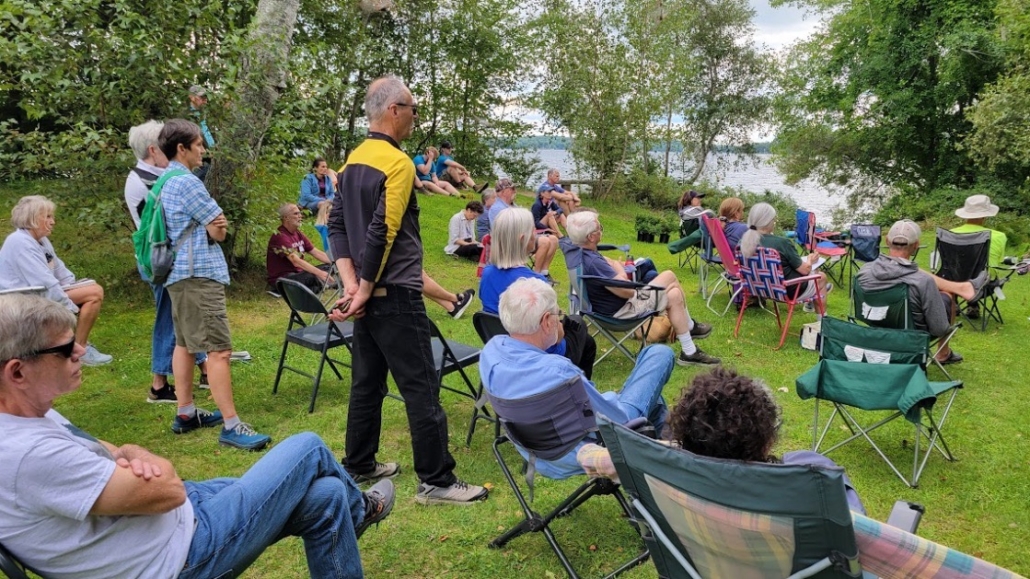Transformational new laws to protect residents of mobile home communities take effect
 Last week, four new laws sponsored by Senate Democrats to preserve some of the strongest remaining affordable housing options in Maine took effect. These transformational laws, passed by the Legislature and signed by Gov. Mills earlier this year, aim to help residents of mobile home communities purchase the parks they live in via a right of first refusal, tax incentives and a new method of funding the Mobile Home Park Preservation and Assistance Fund.
Last week, four new laws sponsored by Senate Democrats to preserve some of the strongest remaining affordable housing options in Maine took effect. These transformational laws, passed by the Legislature and signed by Gov. Mills earlier this year, aim to help residents of mobile home communities purchase the parks they live in via a right of first refusal, tax incentives and a new method of funding the Mobile Home Park Preservation and Assistance Fund.
These laws come as Maine has seen a growing trend of out-of-state private equity firms attempting to buy up mobile home communities. Often, these corporate firms raise lot rents on residents and neglect maintenance.
“Over the past year, the Housing and Economic Development Committee has taken a hard look at how to build more housing in Maine and, just as importantly, how to protect the affordable housing we still have,” said Sen. Chip Curry, Senate Chairman of the Legislature’s Housing and Economic Development Committee. “These new laws give residents a fighting chance to stay in their homes and safeguard their communities. They push back on business models that put profits over people, and they show what it looks like when we legislate with urgency, compassion, and impact.”
LD 1145, “An Act to Protect Residents Living in Mobile Home Parks,” introduced by Sen. Tim Nangle, D-Windham, creates a right of first refusal for resident cooperatives to match a third-party offer to purchase the park they live in, providing them with the ability to control their future housing costs while ensuring that sellers receive the full market value of their property.
“Mobile home communities are not commodities. They are neighborhoods where families, veterans and seniors have built their lives,” said Sen. Nangle. “Maine can’t solve our housing crisis if we don’t also protect the affordable homes we already have. This law ensures that when these communities go up for sale, residents have the chance to step up and protect their homes, their dignity and their way of life.”
LD 1016, “An Act to Establish the Manufactured Housing Community and Mobile Home Park Preservation and Assistance Fund,” introduced by Sen. Cameron Reny, D-Bristol, creates a per-lot transfer fee on the purchase of mobile home parks, which applies only to purchasing entities with a net worth of more than $50 million, preserving the ability of local for-profit, non-profit and resident co-ops to buy and sell parks as they have for decades. Revenues from the transfer fee paid by equity firms and other high-end investor entities go toward a permanent Mobile Home Park Preservation and Assistance Fund to support residents at risk of displacement.
LD 554, “An Act to Encourage Resident-owned Communities and Preserve Affordable Housing Through Tax Deductions,” also introduced by Sen. Reny, creates a tax deduction to incentivize the sale or transfer of housing developments, manufactured housing communities, or apartment complexes to resident-owned communities, cooperative affordable housing corporations, or municipal housing authorities. This law allows for an income tax exemption of up to $750,000 on capital gains from these transfers.
“All Maine people deserve the opportunity to be secure in their housing,” said Sen. Reny. “This year, we’ve been working hard to preserve one of Maine’s last forms of naturally affordable housing: mobile home and manufactured home communities. My bills, LD 554 and LD 1016, help give residents the leg up they need when trying to purchase the land under their homes and invest in the future security of their community. I’m glad to see these tools become available to Maine residents.”
LD 1768, “An Act to Protect Residents of Mobile Home Parks by Amending the Real Estate Transfer Tax,” introduced by Sen. Donna Bailey, D-Saco, eliminates the real estate transfer tax on sales of mobile home parks when the buyers are the residents themselves.
“This year, my colleagues and I worked hard to maintain and preserve the affordability of mobile home parks,” said Sen. Bailey. “Whether it’s residents of Atlantic Village, Blue Haven or Old Orchard Village, I continue to hear from folks who worry about the sales of their parks or steep increases in their rents. Over the summer, I have been attending meetings in these communities. I also can’t forget a mother who recently wrote to me. She works full-time while raising her two sons, and her family budget is already stretched thin. She is doing all she can. Having experienced something similar, I know these laws matter. I also know that we have more work to do.”
As non-emergency legislation, these new laws took effect on September 24, 2025, 90 days after the First Special Session of the 132nd Legislature adjourned.
LD 1145, the right of first refusal law, was initially proposed as emergency legislation that would take effect immediately upon the governor’s signature, but House Republicans blocked the bill from receiving the necessary two-thirds vote.
Responsible journalism is hard work!
It is also expensive!
If you enjoy reading The Town Line and the good news we bring you each week, would you consider a donation to help us continue the work we’re doing?
The Town Line is a 501(c)(3) nonprofit private foundation, and all donations are tax deductible under the Internal Revenue Service code.
To help, please visit our online donation page or mail a check payable to The Town Line, PO Box 89, South China, ME 04358. Your contribution is appreciated!




Leave a Reply
Want to join the discussion?Feel free to contribute!